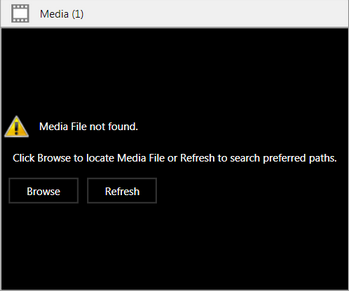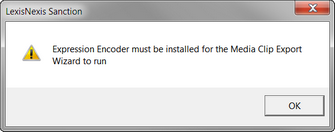Support Notes
This article provides support notes that pertain to Sanction 3.6.
This page pertains to Sanction 3.6. For documentation on the most current version of Sanction, open the the LexisNexis Litigation Solutions documentation portal. From there, open the link to the Sanction Answer Center.
When you create a case, Sanction automatically creates a backup of the case file. Whenever the case is open, as you continue to work on it, Sanction periodically updates the backup file. The backup case file is saved in the same folder as the case file. Note that exhibit files, transcript contents and media elements of the case are not backed up. The backup copy is named the same as the case file, but with the hour, minute, and second of the last backup formatted as .HHMMSS appended to the case name. For example, a case named Hawkins V Anstar.lns3 might have a backup file named Hawkins V Anstar.011000.lns3. To restore your case from the backup file
|
A media playback error will result if the file associated with a media item is inaccessible by the player. Media playback errors occur with any the following item types:
Symptoms The problem presents differently in the main program window versus in the presentation window.
Cause Playback problems may result when any of the following conditions are true:
The following table provides the steps for establishing a preferred media path to a missing media item. This can be done whether a presentation is running or not.
|
Microsoft Expression Encoder 4, Service Pack 2 must be installed for the export of media, media clips, or playlists. If you do not have Expression Encode installed and attempt to export media an error message will open and the export process will stop. Resolution There are two possible resolutions:
|
Symptom After importing a media file, when you try to open it in the media player, an error message box opens saying it cannot play the file. Cause A codec may be missing that allows your computer to play the media file. Background A codec is a small program that allows your computer to play a specific type of media file. Your computer needs a different codec for each type of media file you want to play. When you attempt to open a media item in Sanction, playback will fail if the codec required to play that type of file is not installed. More Information Codec support for the media player in Sanction is provided by the Microsoft Windows Media Player 12. The range of codecs installed with Windows Media Player 12 is extensive and allows playback of the most commonly used media file types and subtypes. For more information on working with codecs with Windows Media Player 12, especially with determining which codecs are installed on your computer and how to add new ones, see the Microsoft Knowledge Base article, Basics about videos and video codecs in Windows Media Player on the Microsoft support website. |
Sanction writes log files that store usage data for the 10 most recent sessions. If you need to contact support, you can provide them with log files, which might help to troubleshoot Sanction. Sanction saves the log here: C:\Users\UserName\AppData\Local\LexisNexis\Sanction\3.6 Where UserName represents the user name you use when you log on to Windows to run Sanction. |




